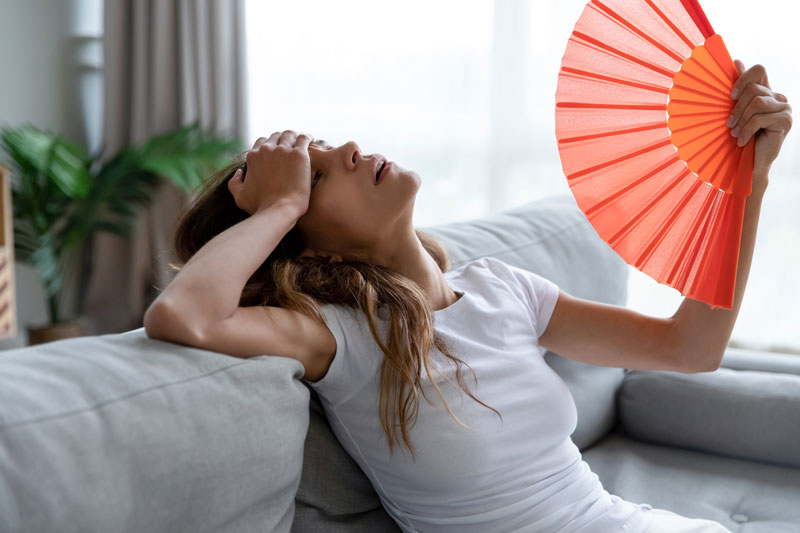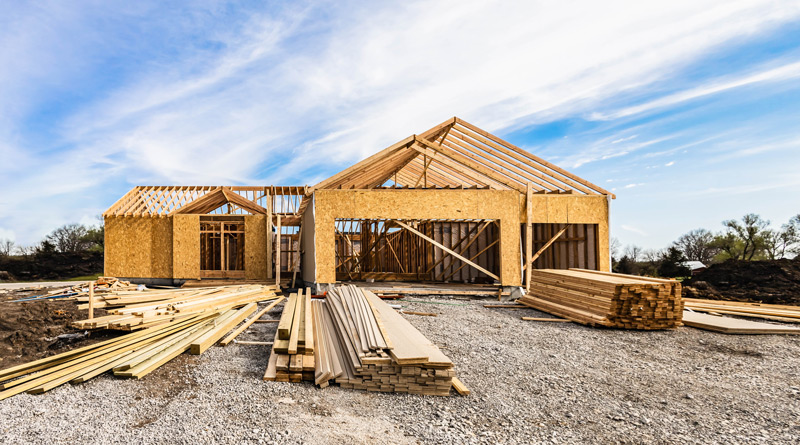| Breathe Easy: Improving Your Indoor Air Quality This Summer |
 
As the warm summer months approach, many of us are getting ready to open the windows and let in some fresh air. But have you examined the quality of air in your home? Indoor air quality (IAQ) is a crucial but sometimes disregarded feature of our living environment, particularly during the summer months when we spend more time indoors with closed windows and doors.
Why Indoor Air Quality Matters
Indoor air quality refers to the cleanliness and healthiness of the air within buildings, including homes, offices, and schools. Poor IAQ can have a significant impact on our health, leading to respiratory issues, allergies, and other health problems. Common pollutants that affect IAQ include:
-
Dust and dust mites
-
Pollen
-
Mold and mildew
-
Pet dander
-
Tobacco smoke
-
VOCs (Volatile Organic Compounds) from household products and building materials
-
Indoor air pollutants can be especially problematic during the summer when we rely on air conditioning, which can recirculate indoor air, trapping pollutants inside.
Tips for Improving Indoor Air Quality
Fortunately, there are several steps you can take to improve the indoor air quality in your home:
-
Keep it Clean: Regular cleaning, including dusting, vacuuming, and mopping, can help reduce dust and allergens in your home.
-
Control Humidity: Use a dehumidifier to maintain indoor humidity levels between 30-50% to prevent mold growth.
-
Ventilation: Proper ventilation is key to maintaining good IAQ. Open windows when possible and use exhaust fans in kitchens and bathrooms.
-
Air Purification: Consider using air purifiers with HEPA filters to remove airborne particles and improve air quality.
-
Reduce VOCs: Choose low-VOC or VOC-free household products and materials when possible.
-
No Smoking: Smoking indoors can significantly reduce indoor air quality. If you smoke, do so outside.
-
Regular Maintenance: Maintain your HVAC system and change filters regularly to ensure it is working efficiently.
Benefits of Improving Indoor Air Quality
Improving indoor air quality can have several benefits, including:
-
Improved respiratory health
-
Reduced allergy symptoms
-
Better sleep
-
Increased comfort and well-being
-
Enhanced productivity and cognitive function
As we prepare for the summer months ahead, let's not forget the importance of indoor air quality. By taking simple steps to improve IAQ, we can create a healthier and more comfortable living environment for ourselves and our families. If you have concerns about your indoor air quality, contact a professional HVAC technician to assess your home and recommend solutions. Breathe easy this summer with cleaner indoor air!
|
|
|
| Inhale, Exhale, Improve: The IAQ Guide for Sudbury Homes |

As Sudbury's winter gently gives way to the promise of spring, our attention turns to maintaining cozy, inviting homes amidst the shifting temperatures. While choosing the right heating system is important, another important factor that often goes unnoticed is indoor air quality (IAQ) as we embrace this season of change.
Why does Indoor Air Quality matter? Let's explore the reasons why it should be a priority for every homeowner.
Health and Well-being
Indoor air quality directly impacts our health and well-being. Poor IAQ can lead to various health issues, including respiratory problems, allergies, and even more serious conditions over time. Dust, pollen, mold spores, and other contaminants can accumulate in our homes, especially during the winter when we keep our windows closed. A high-quality air filtration system can help reduce these contaminants, improving the air we breathe.
Comfort and Productivity
Good IAQ isn't just about securing our health, it also affects our comfort and productivity. Musty air can make us feel lethargic and uncomfortable. Whereas fresh, clean air can boost our mood and energy levels, increasing our productivity and a better overall quality of life.
Protecting Your Home
Poor IAQ can also have long-term effects on your home. Excessive moisture due to poor ventilation can lead to mold growth, which can damage your walls, ceilings, and floors. So if you already had your wall decorated with your favorite wall art be aware
The best solution for this is investing in a good ventilation system that can help protect your home from these issues.
Energy Efficiency
Believe it or not, IAQ can also affect your home's energy efficiency. A well-ventilated home can reduce the workload on your heating system, leading to lower energy bills. Additionally, a clean HVAC system operates more efficiently, saving you money in the long run.
Now let's look into some of the key steps that can help you improve your home's indoor air quality
Air Purifiers
Invest in a high-quality air purifier to remove pollutants from the air.
Ventilation
Always ensure your home is properly ventilated to allow for the exchange of indoor and outdoor air.
Humidity Control
Maintain the right humidity levels in your home to prevent mold growth and improve comfort.
Regular Cleaning
Regularly clean and dust your home to remove pollutants and allergens.
HVAC Maintenance
Schedule regular maintenance for your heating and cooling system to ensure it operates efficiently and doesn't circulate contaminants.
At Campeau Heating, we understand the importance of indoor air quality. That's why we offer a range of solutions to help you improve the air you breathe in your home. From air purifiers to ventilation systems, our team of experts can help you find the right solution for your needs.
Don't overlook the importance of indoor air quality. Connect with us today to learn more about how we can help you improve the air quality in your home.
|
|
|
| Inhale, Exhale, Improve: The IAQ Guide for Sudbury Homes |

As Sudbury's winter gently gives way to the promise of spring, our attention turns to maintaining cozy, inviting homes amidst the shifting temperatures. While choosing the right heating system is important, another important factor that often goes unnoticed is indoor air quality (IAQ) as we embrace this season of change.
Why does Indoor Air Quality matter? Let's explore the reasons why it should be a priority for every homeowner.
Health and Well-being
Indoor air quality directly impacts our health and well-being. Poor IAQ can lead to various health issues, including respiratory problems, allergies, and even more serious conditions over time. Dust, pollen, mold spores, and other contaminants can accumulate in our homes, especially during the winter when we keep our windows closed. A high-quality air filtration system can help reduce these contaminants, improving the air we breathe.
Comfort and Productivity
Good IAQ isn't just about securing our health, it also affects our comfort and productivity. Musty air can make us feel lethargic and uncomfortable. Whereas fresh, clean air can boost our mood and energy levels, increasing our productivity and a better overall quality of life.
Protecting Your Home
Poor IAQ can also have long-term effects on your home. Excessive moisture due to poor ventilation can lead to mold growth, which can damage your walls, ceilings, and floors. So if you already had your wall decorated with your favorite wall art be aware
The best solution for this is investing in a good ventilation system that can help protect your home from these issues.
Energy Efficiency
Believe it or not, IAQ can also affect your home's energy efficiency. A well-ventilated home can reduce the workload on your heating system, leading to lower energy bills. Additionally, a clean HVAC system operates more efficiently, saving you money in the long run.
Now let's look into some of the key steps that can help you improve your home's indoor air quality
Air Purifiers
Invest in a high-quality air purifier to remove pollutants from the air.
Ventilation
Always ensure your home is properly ventilated to allow for the exchange of indoor and outdoor air.
Humidity Control
Maintain the right humidity levels in your home to prevent mold growth and improve comfort.
Regular Cleaning
Regularly clean and dust your home to remove pollutants and allergens.
HVAC Maintenance
Schedule regular maintenance for your heating and cooling system to ensure it operates efficiently and doesn't circulate contaminants.
At Campeau Heating, we understand the importance of indoor air quality. That's why we offer a range of solutions to help you improve the air you breathe in your home. From air purifiers to ventilation systems, our team of experts can help you find the right solution for your needs.
Don't overlook the importance of indoor air quality. Connect with us today to learn more about how we can help you improve the air quality in your home.
|
|
|
| How to Protect Indoor Air Quality in The Wake of Summer Heat |

How to Protect Indoor Air Quality in The Wake of Summer Heat
Summer has arrived once again, and we're here for it!
But with summer heat comes a myriad of unpleasant air quality issues. Some we already saw before summer even hit!
Earlier this month, much of Ontario smelled like a giant bonfire. This was, of course, due to wildfires burning across the county. Smoke from out West, Quebec and Northern Ontario became wind-borne - lowering air quality throughout Ontario.
In fact, at one point during this event, Toronto’s air quality ranked among the world’s worst! By that same evening, the air quality index of Ottawa rose to above level 10 (very high risk)!
Smoke exposure causes eye irritation, coughing and respiratory difficulties. No wonder much of the province was highly encouraged to limit their exposure as much as possible.
After the spring we’ve had, with early heat waves and poor air quality, who knows what could happen next!
Thankfully, the smoke continues to dissipate today. But the risk of coming heat waves looms.
Many homeowners have come to us with the same question, “how do I protect my indoor air quality this summer?”
At the end of this article, we explore 4 products to keep your home air quality clean, safe and comfortable.
But first, let’s look at some common causes of poor indoor air quality during the summer months.
Common Causes for Poor Indoor Air Quality In Summer
It’s commonly assumed that air quality is worse in the summer than in the winter. But while we can confirm that air quality worsens in the summer, we cannot say that it is worse in one season vs. another.
All seasons in Canada have their own air quality risks. The important thing is to understand what those risks are so that you can mitigate the issue.
Besides the risk of wildfires, there are three other factors to consider.
Let’s explore them below:
Heat
Heat waves are something many Ontario residents are familiar with.
One second you’re enjoying a cool breeze at 23 degrees Celcius. The next, you’re thrown into 30 degrees weather with little to no wind!
These heat waves are typically short-lived. But wow, do they ever hit hard!
If you live in Sudbury, Ontario, you’re feeling the impact of a heat wave right now!
Temperatures have risen to 30 degrees or higher, and they’re not lowering until at least Monday.
Sudbury’s air quality index has already hit level 4 (moderate risk) in the last couple of days.
How does high heat affect air quality?
Extreme heat and stagnant air increase ozone and particulate pollution. It also can dry out the soil, increasing the risk of wildfires (hence our current dilemma in much of Canada).
Warmer temperatures can also cause early blooming and prolonged pollen production.
And lastly, warm temperatures paired with high moisture create the perfect environment for mould to thrive. This is humidity!
Humidity
High humidity refers to anything over 50%.
Currently, in Sudbury, Ontario, humidity is around 30-40%, which is fine. But have you noticed how things become quite muggy before a summer thunderstorm?
That's a sign of high humidity!
Here's another:
Have you ever left your windows open and noticed your floors getting sticky? This is a direct result of the heavy moisture in the air.
If you read our last blog, you know all about the effects of high humidity. But if you missed it, here’s a quick recap!
Humidity is crucial for your internal air conditioning system - thermoregulation. This is the process your body goes through to maintain a healthy core body temperature.
If your body becomes too hot, thermoregulation immediately begins. Vasodilation or sweating are two tools your body uses to cool down.
Vasodilation occurs when your blood vessels widen. This widening increases blood flow to cooler areas of your skin. This moves the heat away from your internal core so that it does not overheat.
As that heat reaches your skin, sweat glands release sweat. As sweat releases, it evaporates from your skin - lowering your body temperature.
But there’s a catch.
This process of thermoregulation doesn’t work well if your environment is very humid. Your sweat cannot evaporate when the air is full of moisture. This makes your body vulnerable!
Health Effects of High Humidity:
- Fatigue,
- Muscle Cramping,
- Fainting,
- Dehydration, etc.
Humidity is also a breeding ground for dust mites, bacterial growth and allergens!
Allergens
Common allergens in your home during summer include dust mites, pet dander and pollen.
These three allergens thrive in the summer months due to high heat and moisture. If you don’t take the necessary precautions, they are likely to grow at an exponential rate!
In the past week, Sudbury’s allergy outlook stated a very high pollen count.
While you may not be sensitive to these pollens, others in your family might be. This risk is why it’s so important to fend off these harmful air pollutants.
4 Products To Protect Your Home Air Quality
There are many ways to improve and protect your indoor air quality. Our indoor air quality experts have listed their top suggestions below:
Install Air Conditioning
Did you know that A/C is the number one way to protect against heat-related illness and death (CDC)?
Our last article discussed how air conditioning can help keep you safe during a heat wave. Wow, did we cover a lot of material there!
Interested in learning more about the benefits of air conditioning this summer? We encourage you to check out that article!
If you’re in the market for the cliff notes of the story, here are the top benefits of A/C we discussed:
- Helps maintain a healthy core body temperature.
- Reduces and controls humidity.
- Reduces the risk of dehydration and other heat-related health issues.
- Improves sleep.
- Improves indoor air quality.
At Campeau Heating, we offer a variety of air conditioning systems! Choose from our ductless, central, high velocity and geothermal lines.
Increase Air Ventilation
Adequate ventilation is vital for clean, healthy air. It is the process of exchanging air into and out of your home.
Whole home ventilators (ERVs or HRVs) are a great way to improve the air quality throughout your home.
Ventilation systems improve your indoor air quality by,
a) Removing pollutants, and
b) Bringing in fresh, filtered air from outside.
A Heat or Energy Recovery Ventilator: Which is More Effective?
Install an Air Purification/Filtration System
Filtering and purifying your indoor air with the right equipment is essential.
At Campeau Heating, we supply a variety of air-cleaning products, from UV to HEPA! Both of these systems have the power to remove and/or destroy harmful particles from your indoor air.
A UV purification system kills viruses, bacteria, protozoa, etc.
It can even kill mould spores!
A HEPA filter can remove dust, mould, bacteria and pollen. If there’s an airborne particle about 0.3 microns big floating around, you can count on your HEPA filter to catch it!
Improve Humidity Control
As mentioned above, humidity is one of the leading causes of poor air quality during the summer. And it isn’t just harmful to you! It can also damage furniture, flooring and other structural elements in your house.
This is why humidity control is so vital.
Thankfully, there’s a reliable system that makes humidity control fast and simple!
A whole-home dehumidifier helps maintain a healthy humidity level in your home 24/7.
Improve Your Indoor Air Quality With Campeau Heating
At Campeau Heating, we care about your indoor air quality. Our team keeps your home as safe and comfortable as possible!
Not sure where to begin with your air quality improvement this summer?
Contact our experts at (705) 560-2441! We can help you choose the right products for your home, lifestyle and budget.
|
|
|
| How Air Conditioning Can Help Keep You Safe During a Heat Wave |

How Air Conditioning Can Help Keep You Safe During a Heat Wave
Air conditioning in Sudbury, Ontario, is more important than ever!
What was once considered a luxury is now necessary for most homes in Ontario.
Here’s why:
Temperatures in Ontario are unpredictable.
One day, you’re enjoying a beautiful cool breeze. The next, you’re escaping indoors to avoid a heat wave!
Summer temperatures can reach 30 degrees C, and humidity levels are no better - making it feel even hotter!
The Farmers’ Almanac actually released its forecast for summer 2023 recently. Apparently, we can expect this summer to be even warmer and dryer than typical years.
What does this mean for you?
Are there ways to lessen the danger and protect your health as the summer heat approaches?
Keep reading to find out!
The Dangers of Heat For Your Health
We’ve all heard the classic lines "wear sunscreen" or "throw a hat on" a thousand times.
With the danger of exposure to harmful UV rays, this isn’t anything new.
But what about the dangers associated with high heat?
Sunscreen and ballcaps only go so far in protecting your health.
The next step is to find a solution for high heat and humidity.
How dangerous can high summer heat be?
In severe cases, heat can be deadly.
According to Statistics Canada, 595 people died in BC due to one of the longest and hottest heat waves in Canadian history. This happened in 2021 - only two years ago!
Eleven years before that (2010), a heat wave in Quebec caused 280 deaths.
While these statistics are Canadian-based, not Ontario, we can’t deny how close to home they hit.
In our books, it's too close.
And it’s not just the fatal cases we need to worry about!
Exposure to high heat can cause dehydration, heat exhaustion and heat stroke.
There is also a risk of chronic conditions flaring.
This typically only occurs when high temperatures of 32 degrees C or higher last two or more days. According to Aaron Bernstein of Harvard T.H. Chan School of Public Health, flare-ups can commonly occur in people who suffer from existing conditions like
- Migraines,
- Arthritis,
- Asthma,
- Cardiovascular disease, etc.
To sum it up, our bodies are not designed to handle high heat for long periods. According to Bernstein, “We’re warm-blooded, and our whole body is designed to operate within a narrow range of temperatures.”
If our body gets too hot, it can’t function properly. Our heart, lungs, brain and kidneys can malfunction or slow down. This is a huge risk for people with existing organ problems.
So, how can you protect yourself and your family from these health risks?
- Drink plenty of fluids.
- Avoid the outdoors during the hottest parts of the day.
- Wear sunscreen.
- Wear lightweight, light-coloured clothing.
- Take cool showers.
- Check your local news or weather app for health and safety updates.
Another tip is to install whole home air conditioning!
Is Air Conditioning The Solution?
If you don’t currently have an air conditioning system installed, we highly recommend it.
According to the CDC, A/C is the number one way to protect against heat-related illness and death.
Below are some of the top health benefits of installing A/C:
Lower Your Core Body Temperature
The main purpose of an air conditioner is to cool and regulate the temperature of a given space, such as your home.
Once your home gets too warm, the A/C kicks on and begins removing excess heat and moisture.
The result is a temperature-controlled space that is safe and comfortable.
Did you know your body has a similar process when it gets too hot? It basically has a built-in air conditioning system called thermoregulation.
Thermoregulation occurs when your internal temperature (core body temperature) changes. If it becomes too hot, your body uses internal mechanisms to cool it down. These include sweating and vasodilation.
As you sweat, the moisture from your body evaporates off your skin, lowering your body temperature. But this process is quite challenging when the air is too humid for evaporation to occur.
That’s where air conditioning comes in to save the day!
A/C removes the excess moisture from your air, allowing your body to sweat properly. It also helps cool your environment - making it easier for your body to regulate its core temperature.
Reduce Humidity
High humidity is dangerous in your home. As mentioned above, it can reduce your body’s ability to cool naturally. But that’s not all. It can also cause fatigue, muscle cramping, fainting, dehydration, etc.
Thankfully, A/Cs are powerful multitaskers!
The system as a whole cools the home down. But, at the same time, the refrigerant within the system removes humidity from your air.
Here’s how that works:
A/Cs pull warm indoor air into the vents, through the return ducts and over the evaporator coil. The refrigerant within the coil absorbs the heat, which is then expelled into the condenser coil.
Then, as the now-cooled refrigerant returns to the evaporator coil, more warm air meets it. This forms condensation.
This condensation is the moisture in your home.
Once the moisture drips into the condensate pan, it flows into a drain pipe outdoors.
Voila - humidity control!
Reduce the Risk of Dehydration
As your body undergoes thermoregulation, you can lose a lot of water. And, as you know, your body needs water to function. Without it, mental and physical performance can deteriorate.
Air conditioning reduces the body’s need to sweat, thus helping prevent dehydration.
Get Better Sleep
Trying to sleep in a hot environment is challenging, uncomfortable and dangerous.
While you’re trying to sleep in this heat, your body works to try and regulate its internal temperature. This means a lot of sweat, discomfort and potential dehydration.
Air conditioning creates a cool environment that’s ideal for optimal rest. This makes it easier to fall asleep and stay asleep!
Improve Indoor Air Quality
Investing in indoor air quality is vital to protecting your health.
Do you have underlying health conditions, such as asthma or allergies? If so, A/C is especially crucial.
Air conditioning circulates and filters your indoor air - removing pollutants and allergens!
Contact Campeau Heating in Sudbury, Ontario
Looking for quality air conditioning in Sudbury, Ontario? Contact our A/C experts at Campeau Heating!
We’ll help you find the right air conditioner for your home, lifestyle and budget.
Call today at 705-560-2441 or shop online!
|
|
|
| Beware of These Harmful Building Materials During Spring Renos |

Beware of These Harmful Building Materials During Spring Renos
The sun is shining again! That means it’s go-time for reno season!
If you’re like most homeowners, the first signs of spring mean it’s time to put all those cooped-up ideas into action. Whether it's redoing your flooring, building that deck or painting the cabinets!
But be careful!
While hammering away, it’s important to consider the materials and processes you use.
Many homeowners have no idea of the impact these materials/processes have on their indoor air quality. And it’s a bigger deal than you think!
Many building materials, products and processes can become a health hazard. That’s why you must know what materials you’re dealing with and how each can affect you.
Are you getting ready to start your first spring project? If so, keep reading!
Harmful Building Materials, Products and Processes
When planning a home project, indoor air quality probably isn't your first thought.
But we’re hoping that after reading this, you’ll be more aware of the potential hazards.
Whether you’re an expert builder or new to the trade, there is always so much to learn. And it’s up to you to ensure you have the knowledge you need to make informed decisions about the health of your home.
So don’t go tearing down walls just yet!
Drywall Dust
If you’re planning on installing drywall, this one’s a doozy!
Installing drywall dust is messy and time-consuming. While the results or beautiful, the process is anything but.
With all that dust in the air, it’s easy to imagine the effects it can have on your indoor air quality.
There is a safe exposure limit of 15 mg/m3 - set by The Occupational Safety and Health Administration (OSHA). But according to a recent evaluation by NIOSH HHE, drywall sanders get 10 times that exposure!
This makes them even more vulnerable!
Health Effects of Inhaling Drywall Dust:
- Lung Irritation
- Lung Inflammation
- Coughing
- Respiratory Difficulties
Wood Dust
Another common thing you’ll see floating around the air during renovations is wood dust.
Wood dust becomes airborne during processes like sawing and sanding. You can typically prevent exposure to it with effective Personal Protective Equipment (PPE). But don’t forget to wear the equipment during the cleaning process too!
Exposure can happen directly during the process and indirectly when cleaning the area.
Health Effects of Wood Dust Exposure:
- Skin Irritation
- Dermatitis
- Respiratory issues
- Sneezing
- Headaches
- Coughing
Chemicals in Building Materials and Processes
When preparing for a project, you look for the most durable materials. This ensures that the result is sturdy and safe.
But many people don’t realize that the sturdiness of their materials is only one safety aspect.
The other lies in the installation or deconstruction processes, and how they affect air quality.
The installation process usually requires the use of adhesives, sealants and coatings. These products almost always emit VOCs during and after their installation. While some are harmless, others are odorous, irritating or toxic.
During the deconstruction process, you may have to disturb some of these hazardous materials. While they are harmless if left untouched, disturbing them isn't safe. This can cause harmful particles to become airborne.
Below is a list of some common chemicals in building materials and processes.
Formaldehyde in Laminate Flooring
Certain types of laminate flooring off-gas formaldehyde - an odorous and flammable chemical.
This chemical exists naturally in the air at low levels (less than 0.03 ppm). And most people have no problems when exposed to it. But others can experience irritation to their eyes, nose, throat, airways and skin.
Scientists also linked high levels of formaldehyde over many years to rare nose and throat cancers in workers.
Thankfully, the exposure in laying a laminate floor isn't enough to severely harm you.
Note: Do you have laminate flooring in your home made in China between 2012-2014? If so, we recommend assessing your health immediately. The CDC and ATSDR only evaluated certain types of this flooring. That means they may not all be safe for your home.
Off-Gassing Solvents in Vinyl Flooring
Vinyl flooring is another synthetic material replicating a wooden floor.
With this type of flooring, you’ll want to be extremely careful with the installation process.
Most installation processes are harmless. But others emit of-gassing solvents that can affect your air quality and health.
Asbestos in Popcorn Ceiling and Insulation
Asbestos is a heat-resistant fibrous silicate mineral.
Popular placements for this material were popcorn ceilings and home insulation between 1950-1980.
When left undisturbed and isolated, this material is harmless.
But if disturbed (handled, sawed, or sanded), this material can become a health hazard.
If you have asbestos in your home, only allow a professional to remove it.
Lead in Old Paint
Don't start painting or stripping paint just yet! You must first be mindful of the potential hazards.
For example:
If you’re planning on stripping old paint in a house built before 1978, there’s lead air pollution to worry about.
Lead is toxic metal with zero safe level of exposure.
You typically have nothing to worry about if you leave the paint untouched and it is in good condition. But if you scrape the paint off or it becomes chipped, the harmful particles become airborne.
Lead is extremely dangerous - causing lead poisoning in almost every system of the body.
Harmful Effects of Lead Exposure:
- Behavioural Problems
- Reduced Cognitive Function
- Seizures
- Paralysis
- Brain and Kidney Damage
If you plan to remove lead paint from your home, take the necessary safety precautions. Only allow a trained professional to remove it.
Protect Your Indoor Air Quality This Reno Season
Your indoor air quality is vital to the health of your family and home.
Now that you know what you’re up against, you’re more prepared to get the job done safely!
Want more indoor air quality tips? Like us on Facebook to never miss a blog post!
|
|
|
| Important Things To Consider When Building a New Home |

Important Things To Consider When Building a New Home
Happy home-building season!
If you’re building your new home, this article is for you.
New home construction involves countless, timely decisions. From outlet placement to kitchen cabinets and home layout, there’s always a decision to make.
The fun part is deciding what your dream home will look like. The downside is how much time you’ll spend in the selection process.
Let’s be honest. Once you browse 50 different flooring choices, they all start to meld together. Suddenly, choosing the best features for your new home becomes stressful and time-consuming.
Thankfully, we can help take some of the load off!
While we aren’t homebuilders, we play a vital role in setting up the major systems within your new home.
Our team of professionals handles everything from whole-home HVAC to your patio barbecue!
It's our goal to help keep your project moving forward - on schedule and within your budget. We also offer expert guidance and advice for important decisions along the way!
Keep reading to learn how Campeau Heating can help you make your dream home come true.
Get a free quote on new home HVAC design and installation!
New Home Heating and Cooling
Your brand-new home deserves unmatched comfort, efficiency and reliability.
That’s why our team equips homeowners with only the best in Sudbury heating and cooling systems.
Our Heating Options:
- Gas Furnace
- Oil Furnace
- Electric Furnace
- Geothermal
- Fireplaces
Browse our heating units.
Our Cooling Options
- Ductless
- Central Air
- High Velocity
Browse our cooling units.
If you’re installing central heating and cooling, there are a few extra factors you’ll need to consider.
Beyond system selection, you’ll also need to plan the unit size, placement, and ductwork layout.
The ideal system size for your home varies according to:
- The structure and size of your home.
- Your lifestyle.
- Your heating/cooling needs and preferences.
Ideal unit placement usually depends on electrical access and soundproofing.
Lastly, when deciding on the ductwork layout, you’ll need to consider how to:
- Plan the most direct route.
- Conserve the most energy.
- Save the most space.
- Reduce as much noise as possible.
Not sure where to begin?
Don’t worry - we’ll handle the majority of these decisions for you, so you can focus on the big picture.
We may need to consult your construction and electrical team throughout this process. But we’ll do our best to make the process as straightforward and stress-free for you as possible.
Learn more about the New Home Construction HVAC process!
New Home Indoor Air Quality
Another major factor to consider in your new home construction is indoor air quality.
Right now, your home is probably covered in sawdust and totally roofless. So this may seem like a topic you don’t really need to think about for a while.
But think again!
It’s never too early to start looking into the air quality of your forever home.
After all, that’s the air you, your family and your friends will breathe in. It should be as clean and safe as possible.
With a new home built, you have a unique opportunity to prevent poor indoor air quality. Rather than battle it.
But to achieve that, you’ll need to consider:
- Using building materials that are low-emitting.
- Ensuring proper ventilation in the structure of your home.
- Preventing moisture leaks in ceilings, windows, etc.
- Installing indoor air quality products.
Our indoor air quality experts at Campeau Heating help you create a healthy home environment.
Our Indoor Air Quality Products:
- Aldes HRV
- Napoleon HRV
- Napoleon UVC
- Cinquartz Filtration
- Electro Air 3-IN-1 TRUE HEPA, UVC & PCO AIR CLEANER
Browse our indoor air quality products.
New Home Backup Power System
Preparing your new home with all the latest HVAC systems is great. But what happens during a power outage?
Power outages are unpredictable and inconvenient. They happen at the worst times - leaving you without the essential systems in your home.
No heating. No fridge or freezer. No cooking appliances. No sump pump. No running water.
That’s why we always recommend installing a reliable backup generator!
At Campeau Heating, we supply only the best in backup power. That’s why we work with Kohler generators!
Kohler designs these generators for ultimate efficiency, durability and reliability.
Browse Our Kohler Generators.
Not sure which size best fits your power needs? We can help!
New Home Outdoor Systems
If you live in Sudbury, Ontario, you know how stunning the landscape is. With all the gorgeous lakes, hills and rock faces, it’s incredible!
We love the outdoors. In fact, we can’t get enough of it!
That’s why we’ve helped homeowners extend their patio season with outdoor products!
Outdoor Fireplaces & Pits
Outdoor fireplaces are a gorgeous addition to your new home build. Not only are they 100% practical, but they also increase your home value and its aesthetic appeal!
Installing an outdoor fireplace can:
- Expand your personal living space.
- Give yourself more room to host friends and family.
- Extend your seasonal enjoyment.
You can shop our selection of Heat and Glo and Napoleon online!
Browse Our Outdoor Rireplaces.
Napoleon Barbecues
Another way to enjoy the great outdoors is by extending your kitchen outside!
We recommend investing in patio furniture, a picnic table and a good quality barbecue! This creates a great outdoor atmosphere that you and your guests will love.
Our Napoleon Barbecue Selection:
- Gas Grills
- Charcoal Grills
- Built-in Gas Grills
- Portable Grills
Shop Our Napoleon Barbecues.
Complete Your New Home Construction Project With Campeau Heating
Congratulations on your new home build!
Building your dream home is an exciting time for you and your family.
We are so excited to be a part of it!
To get started, call us at 705-560-2441 or contact us online.
|
|
|
| Your 2023 Spring Cleaning Guide - IAQ and HVAC Sudbury |

Your 2023 Spring Cleaning Guide - IAQ and HVAC Sudbury
It’s official… Spring is here!
This winter seemed to take forever to end. With a lengthy start to the season, an early thaw and an unexpected cold front - we thought we’d never see the light of a Spring day again!
Thankfully, that wasn’t the case. The weather is finally starting to warm up!
And we all know what that means…
Let the spring cleaning begin!
In today’s blog article, we’re getting down to the nitty-gritty - literally.
Welcome to your 2023 spring cleaning guide! We have everything you need to know about prepping your indoor air quality (IAQ) and HVAC for the Sudbury spring season ahead.
Let’s dive in!
Change Your HVAC Filter
First up is your HVAC filter. This thing gets dirty, fast!
After trapping pollutants all winter long, it’s bound to be grimy and gross.
Hair, dust, pet dander and dirt quickly clog a filter - making your system work extra hard to push air through.
This not only lowers the effectiveness of the system but also its energy efficiency.
Changing your air filter also helps improve your home's indoor air quality!
According to the U.S. Department of Energy, replacing a dirty filter can lower your air conditioner’s energy consumption by 5-15%!
Not sure which filter your system needs? Give our team a call!
We help identify the best filter size and MERV rating.
Learn how to choose and care for your furnace filter at home!
Pro Tip: Now is the time to change the filters in all your equipment - vacuums, dryer lint screens, exhaust fan grilles, etc.
Book a Duct Cleaning
Next up, your ducts!
Much like HVAC filters, ductwork collects harmful contaminants over time. But unlike a filter, your ductwork is not so easily replaced.
And thank goodness for that! Replacing ductwork every 2-3 years would really rack up your HVAC repair bills!
The obvious solution is to then clean them. But it’s not like you can climb in on your hands and knees as if it were a tunnel either.
That’s where professional duct cleaning comes in!
This process can boost your IAQ and increase the energy efficiency of your HVAC system.
Duct cleaning services remove grime, mould and other contaminants. They leave your ducts ready to circulate clean air for another 2-3 years!
Clean Vents and Registers
We’re working our way out!
After you’ve cleaned your ductwork internally, it’s time to focus on the entry points - your vents and registers.
To clean them, simply remove the registers, wipe them down, and clear out the debris.
If you have little ones running around, or even pets, this particular task might give you a good laugh!
We can’t tell you how often we’ve found strange objects lingering in these little pockets of your home.
We’ve found everything from toys, to marbles, to socks, to birthday cards! Seriously.
And, as you can probably guess, all these tiny objects can obstruct the airways of your home.
Clean Outdoor A/C Unit
Your actual A/C unit is next on the list!
If you read our blog on how to shut down your A/C for the winter, your outdoor unit is most likely well-covered.
This cover helps protect your unit from ice, snow and other debris over the fall and winter seasons.
But this cover doesn’t completely stop nature from getting in.
Dirt, leaves, seeds and twigs could still clog your system - preventing peak efficiency.
Here’s how to clean it!
- Turn the power off.
- Use a vacuum to dust off the fins (we recommend a soft brush attachment.
- Hose off the fins.
- Let the unit dry.
- Restore power!
Clear Around The Condenser
Cleaning AROUND the condenser is just as crucial as cleaning INSIDE it.
Even during winter, weeds and shrubs grow. Removing all organic matter surrounding the unit helps prevent obstruction to airflow.
How far out should you clear?
We recommend clearing a two-foot radius surrounding the unit.
It’s also helpful to place mulch, bricks, gravel or stones around the unit to prevent further growth!
Replace Batteries in Detectors
When was the last time you checked the batteries in your home detectors? This includes your smoke alarm and carbon monoxide detectors.
Since we don’t necessarily hear these devices sound their alarms very often, it’s easy to forget they even exist.
That is until you really need them.
Check and replace the batteries on each device in your home to keep your family and home well-protected!
Install a Whole-Home Ventilation System
Shop IAQ Products
Now onto your indoor air quality (IAQ).
Let’s be honest.
We’re all longing for fresh air after a long winter spent hibernating indoors. But opening the windows just isn’t an option because…well…ALLERGY SEASON!
How do you circulate fresh air in your home without bringing in pollen, dust and other allergens?
By installing a whole-home ventilation system!
Ventilation systems remove stale air and bring in fresh air through depressurizing.
Ventilation oxygenates your indoor air while also removing pollutants, odours and excess moisture.
Install an Air Purifier
Shop IAQ Products
Another great indoor air quality system to invest in this spring is an air purifier. These systems pull in the air - trapping pollutants in the process.
The now clean air is then recirculated back into your indoor air.
This helps to increase the health of your indoor air - improving your breathing, sleep, allergy symptoms, etc.
Check The Humidity Levels
Humidity is both necessary and risky.
Our bodies need moisture to properly function. But too much can also present health risks - like dehydration, dry and irritated skin, and nosebleeds.
Low humidity can also cause wood to crack, splinter and shrink in your home. This puts your hardwood, furniture and even musical instruments at risk.
High humidity encourages mould growth in your home too - risking its structural integrity.
That’s why we recommend monitoring and controlling your home humidity levels.
One way to do this is by installing a whole home ventilation system!
With this system, you can ensure your humidity stays within the recommended 30-50%.
Stay Tuned This Spring For More IAQ and HVAC Sudbury Tips!
Looking for more practical tips on keeping up with your indoor air quality and HVAC systems? We post a new blog every other week!
We fill each blog post with expert advice from our Campeau Heating technicians. So you always get the best, first-hand advice.
Follow us on Facebook to never miss a post!
|
|
|
| Does Indoor Air Quality Affect Your Child's Ability To Learn? |

Does Indoor Air Quality Affect Your Child's Ability To Learn?
It’s the back-to-school season! And parents are doing everything they can to ensure their children are set up for success.
Every backpack holds the best writing tools, the healthiest snacks and the most educational resources. So students have everything they need to learn, grow and excel in the coming school year!
But setting your child up for success is about more than what’s in their backpacks as they walk to the bus stop.
The health of their learning environment also plays a huge role!
Poor indoor air quality can cause many health issues - including allergy symptoms, asthma, coughing, headaches etc.
And each of these hinders your child’s learning environment.
Improving indoor air quality can actually help improve a student's:
- Concentration,
- Productivity and
- Performance!
As kids prepare to return to school this fall, let’s prepare their learning spaces for a healthy academic year ahead!
Why Is Indoor Air Quality at School Important To Consider?
Did you know that according to Ontario Regulations (#298), children ages 7-13 spend roughly 940 hours in school each year?
There are 188 school days and 5 compulsory hours of instruction within each of these days.
And while that’s not the entirety of your child’s life, it is at least 10% of it (annually).
With that amount of time spent in a classroom, it’s obvious why we need to start focusing more on the health of our children's learning environments.
In fact, we saw just how impactful school indoor air quality became during the COVID-19 pandemic.
Ontario schools actually closed down to prevent children from direct virus exposure.
And before reopening, many schools first set out to improve their indoor air quality. Their goal was to create healthy spaces for children to learn during the ongoing pandemic.
As schools open again this fall, many are rushing to improve indoor air quality. In hopes that they can improve not only the health of their indoor air quality but the impact that healthy air has on students’ learning abilities.
How Does Poor Air Quality Affect Your Child’s Focus, Productivity and Academic Performance?
Not only is indoor air quality detrimental to our children’s health, but it’s also crucial in supporting their academic success!
What are some of the factors that can affect a child’s focus, productivity and performance at school?
Rising CO2 Levels
The dangerous chemical compound, CO2 (carbon dioxide), can harm humans physically and mentally.
And with overcrowded, overheated and poorly ventilated classrooms, high concentrations of CO2 are more likely to arise.
High levels of carbon dioxide can cause:
- Headaches
- Restlessness
- Drowsiness
- A lack of concentration
The Solution:
- Install a ventilation system.
- Control CO2 sources.
High Temperature
Temperature also plays an impactful role in your child’s ability to learn.
Recent research has proven that high temperatures affect our ability to process information. And this fact is relevant in both work and schooling environments.
If your surroundings are hot and stuffy, cognitive abilities can deteriorate - making it difficult for you to focus, engage and relate.
As you can imagine, this can affect a child’s,
- Attendance,
- Focus and
- Learning capacity.
The Solution:
-
Install/Repair your furnace and air conditioning system.
Lack of Humidity Control
Humidity tells our bodies that temperatures are higher than they actually are. This misconception causes the moisture on our skin to remain - resulting in our bodies breaking out in sweat.
Some of the physical effects of uncontrolled humidity include:
- Overheating (i.e. heat stroke or exhaustion)
- Increased asthma and allergy symptoms
- Skin and eye irritation
- Dehydration
- Muscle cramping
- Vulnerability to infection
And while your body struggles to combat these physical effects, your mind works double time to focus on external factors (i.e. your classes).
This results in low energy, lethargy and a lack of concentration and engagement.
The Solution:
- Install a dehumidifier.
- Control humidity sources.
Poor Ventilation
Poor ventilation prevents fresh air from replacing stale air! This results in higher pollution, humidity, temperature and quality. Which can then increase stress and lethargy - causing you to feel sluggish, anxious and fowl.
That’s why proper airflow and circulation are vital for healthy indoor air quality.
With constant fresh air, your brain can feel calmer, sharper and happier - creating the ideal inner learning environment!
We discussed the importance of ventilation in one of our recent blog posts. But to sum it up, ventilation can help:
- Improve your physical health
- Improve your mental health
- Manage humidity levels
- And lower indoor air pollution
The Solution:
- Use ceiling fans.
- Install a ventilation system.
Poor HVAC Maintenance
If you’ve been a customer of Campeau Heating for quite some time, then you already know how we feel about proper HVAC maintenance. It’s one of the easiest and most effective ways to boost indoor air quality.
And while we typically mention this to homeowners, it’s equally as vital for public locations: like schools and workplaces.
An HVAC maintenance visit ensures your systems are running at peak performance and efficiency. While also ensuring proper airflow and circulation.
HVAC systems are tough. But with enough dirt and grime, they can quickly become ineffective and dangerous for your health.
Regular, professional HVAC maintenance can help prevent and reduce potential respiratory issues! Thus improving your child’s learning experience.
During an HVAC maintenance appointment, your service technician will,
- Clean all necessary components of your HVAC system.
- Replace dirty air filters.
- Identify and repair leaks, corrosion and other damages.
- Lubricate all moving parts.
- Tighten all electrical connections
- Test all controls.
- And more!
The Solution:
-
Schedule an HVAC maintenance appointment.
Improve Your Child’s Learning Experience With An Indoor Air Quality Boost
Set your child up for success this fall!
You can help ensure their learning environment is healthy and impactful with improved indoor air quality.
Contact your Campeau Heating IAQ expert at (705) 650-2441 or message us online for more information!
|
|
|
| A Heat Or Energy Recovery Ventilator: Which Is More Effective? |

A Heat Or Energy Recovery Ventilator: Which Is More Effective?
We all know the importance of fresh air. After all, it’s one of the key ingredients keeping us alive!
Our bodies need fresh, clean, oxygenated air to function. Grow. Focus. Heal. And so much more! It truly does wonders for both our physical and mental well-being!
But without it, our health immediately begins to suffer.
Do you find yourself feeling stressed, tired or sluggish? Even a few deep breaths of clean, fresh air can make a big difference for your mind and body!
That’s why whole home ventilation is so important.
And while there are manual ways to ventilate your home (i.e. opening the windows), installing a ventilation system is much more effective.
But which ventilation system is better: A heat recovery ventilator or an energy recovery ventilator?
Read on to find out!
Why Is Ventilation So Important?
First things first...
Let’s break down the importance of good ventilation in more detail.
Ventilation removes impure air from your home and brings in fresh air from outside.
This air circulation of stale air with fresh air is what keeps your home livable!
And since Canadians spend roughly 90% of their time indoors, keeping up with fresh air circulation is imperative.
Installing a whole home ventilation system can help:
Lower Indoor Air Pollution
Indoor air pollution is dangerous, and it can come from a variety of sources.
- Household cleaners
- Pesticides
- Wood Smoke
- Radon Gas
- Scented Products
- High Humidity
- Mould
- Cigarette Smoke…etc.
Ventilation can help reduce indoor pollution by diluting it with fresh air. It carries harmful pollutants outdoors and brings clean, fresh air back in.
Manage Humidity Levels
Another factor affecting indoor air quality is high humidity.
Humidity is the amount of moisture (water vapour) in the air. And while some humidity is necessary for our bodies to function safely and comfortably, too much can cause:
- Dust mites,
- Mould,
- Mildew,
- The growth and spread of bacterial and viral organisms,
- Airborne germs and more!
Ventilation has the power to draw out stale, humid air and replace it with fresh, outdoor air!
Improve Your Physical Health
Are you experiencing headaches, fatigue or dizziness?
Maybe your nose, throat and eyes are constantly feeling irritated.
Or maybe your allergy or asthma symptoms are constantly acting up.
These are all signs of poor indoor air quality.
But a ventilation system can help!
Good ventilation can:
- Remove harmful pollutants,
- Lower your humidity and
- Bring in fresh air!
All helping dissipate these symptoms - improving your physical health and overall well-being!
But it’s not just your physical health that improves…
Improve Your Mental Health
With good ventilation, your mental health can also improve!
Did you know that the brain uses about 20% of the body’s oxygen supply. This oxygen is essentially used as a power source for neurons - controlling everything your body can do! From your conscious functions and your unconscious function, your brain controls both.
But without an adequate supply of oxygen, your brain can’t function - affecting your physical and mental health.
With improved ventilation and air quality, you can experience:
- Improved mood.
- Decreased levels of stress hormones.
- Decreased anxiety.
- Improved immune system functionality.
All in all, the healthy circulation of fresh air can help your brain feel calmer, sharper and happier! Just a few more reasons why fresh air is vital to your health!
Heat Vs. Energy Recovery Ventilators
Now that you understand the importance of fresh air circulation in your home, let’s learn how to make that happen.
As mentioned above, numerous ways exist to increase ventilation in your home. Some forms of ventilation even occur naturally - like when you open and close your doors and windows throughout the day.
However, IAQ experts always recommend a more steady and effective solution for indoor ventilation. Especially since home builders construct homes that are way more airtight today than in the past.
Two of the most effective solutions for increasing ventilation include:
a) Heat recovery ventilation and
b) Energy recovery ventilation.
Let’s explore each in more detail below:
Heat Recovery Ventilator (HRV System)
The heat recovery ventilator, or HRV system, continually replaces stale indoor air with fresh outdoor air. This allows it to remove harmful pollutants from your home - including mould, household chemicals, bacteria…etc.
But it does more than that!
An HRV system can also recycle (or recover) heat - lightening the load of your air conditioner and furnace!
Here’s how that works:
During the winter, HRV systems capture stale air, draw heat from it, and use it to preheat the incoming fresh air. This helps your furnace out a lot and can actually lower your heating bills!
During the summer, this process reverses. The HRV system removes heat from the incoming fresh air and transfers it outdoors. This ensures the air conditioner isn’t working extra hard to keep that hot air out of your home - helping you save on cooling costs!
This way, your ventilation system prevents your home from wasting heat energy. Making HRVs a multi-purpose indoor air quality solution!
Energy Recovery Ventilator (ERV System)
The energy recovery ventilator, or ERV system, works similarly to the HRV system. The only difference is that it can do EVEN MORE!
Besides removing harmful pollutants like an HRV system, the ERV system can also recycle moisture. This helps lower humidity levels in your home, making it healthier and more comfortable. But it can also lessen the pressure on your heating and cooling system - ultimately saving you money in the long run!
During the winter, ERVs recycle the moisture leaving your home, preventing your home from becoming too dry.
You can also use ERVs in the summertime! But it is only recommended if you have air conditioning and keep the windows closed. If your indoor air is less humid than your outdoor air, ERVs will ensure that excess humidity from outdoor air stays outdoors. This process allows your air conditioner to cool and dehumidify your home much more easily.
Which Is The Better Ventilation System?
Since the HRV and ERV each offer equally impressive benefits, how do you know which to choose? Is one really better than the other?
Here’s the thing…
The best ventilation system actually depends on your climate, lifestyle, home and specific needs!
For example, is your home quite humid in the winter? If so, then an HRV is probably the better solution.
An ERV doesn’t transfer humidity. It recycles it - keeping it at its source. So if your home is too humid in the winter, the ERV will only hold on to that moisture.
What is your home’s climate like?
If you can answer that question, you’re well on your way to selecting the best ventilation system for your home!
Need Help? Ask The Experts At Campeau Heating!
With Canadians spending more and more time indoors, creating healthy spaces for their health and well-being is vital.
Do you have more questions about how the right ventilation system can help improve your indoor air quality? Our experts at Campeau Heating are always here to help!
Give our office a call today at (705) 560-2441 or contact us online!
|
|
|
| 5 Pet-Friendly Indoor Air Quality Tips For a Healthier Home |

5 Pet-Friendly Indoor Air Quality Tips For a Healthier Home
Our pets are our family. They live in our homes, sleep on our couches, walk on our carpets and snuggle in our blankets. But did you know that owning a pet in your home also comes with health risks?
If you own a cat or a dog, then you already know how much of a nuisance their hair can be when cleaning your home.
And although not something we would trade in, the effects pets have on our indoor air quality is something we need to consider.
We might be able to vacuum the hair off the carpet and mop away the dirt tracked in on their paws, but what about the pet dander floating in the air? What we don’t usually think about is how this hair and dander are affecting our indoor air quality.
In this article, we take a closer look at the indoor air quality affects our pets have on our homes.
What Is Pet Dander? How Does It Affect Indoor Air Quality?
Like many of the allergens and pollutants in our indoor air, pet dander is not something we can see.
That is, not without a microscope.
Pet dander is microscopic and easily transported from one place to another. It can be airborne or even attached to fabrics (carpet, bedding, furniture etc.)
Where does it come from? Your furry friend, of course! Or any mammal with fur, feathers or hair - such as rabbits, hamsters, birds or guinea pigs.
When your pet sheds their coat (hair, fur or feathers), they release tiny particles of skin, called dander. And this dander can trigger an allergic reaction, affecting your breathing and hurting your health.
Common Pet Dander Allergy Symptoms:
- Coughing
- Congestion
- Sneezing
- Itchy nose, throat or roof of the mouth
- Swollen under-eyes
- Hives
- Irritated eyes
- Chest tightness
- Wheezing
But dander is not the only contributing factor to poor indoor air quality from your pet.
Although harmless alone, pet hair can easily track other allergens and air pollutants in your home.
Pollen, mildew, bacteria, faeces and dust mites are just a few pollutants that can walk right through your front door without you noticing.
And each of these pollutants has its own set of health risks to watch out for as well.
So, what are some practical ways to minimize these pollutants in our homes?
Glad you asked!
5 Tips To Manage And Protect Your Indoor Air Quality With Pets
Below are some simple ways to manage pet hair, dander and other allergens at home to help protect your indoor air quality.
1. Change Your HVAC Filter regularly.
The #1 tip we have for improving and managing your indoor air quality is changing your HVAC filter regularly.
Why? Because it is one of the easiest, cheapest and most effective ways of cleaning your air!
This filter traps airborne particles before they have the chance of reaching your airways.
At Campeau Heating, we usually recommend changing your furnace filter or AC filter every 90 days. But if you have a pet or several pets, you should change your filter way more often.
Ideally, pet owners should change their filters every 40-60 days. And these filters should feature,
- A high MPR (micro performance rating) and
- A high MERV rating (minimum efficiency reporting value) of 12-14.
2. Install an Air Purification System.
Installing an air purification system is another effective way of cleaning up your air. These systems use a variety of technologies to not only filter but cleanse your air.
There are 5 types of air purification systems you can choose from:
- HEPA Filters (high-efficiency particulate air)
- UV Air Purifiers (ultravoilet)
- Negative Ion Air Purifiers
- Ozone Air Purifiers
- Activated Carbon Filters
Each produces a similar result but uses a unique form of purification to do it.
For example:
A HEPA filter can remove particulate matter with a size of 0.3 microns. It can filter out dust, pollen, bacteria, VOCs and mould (of this size) with 99.97% success.
A UV air purifier does not remove particulate matter. Instead, it deactivates or kills it. A UV air purifier can effectively deactivate microorganisms and pathogens by destroying the DNA and RNA structures. Essentially, it prevents these pollutants from growing.
Not sure which air purification system will be most effective in your home? Our air quality experts at Campeau Heating can help you choose the best option for you!
3. Install a Whole-Home Ventilation System.
Another HVAC installation that can hugely benefit your indoor air quality is a whole-home ventilation system.
If you have been tracking with our blogs for a while, you may remember us mentioning the importance of good home insulation more than once. This insulation helps keep your home cool in summer and warm in winter.
But good insulation can also trap stale air, moisture, odours, allergens and contaminants inside your home.
The solution?
Installing whole-home ventilation! This system pushes stale air full of pet dander and other pollutants outdoors and replaces it with fresh, clean air.
4. Clean Your Air Ducts Regularly.
When was the last time you looked at your ductwork? Chances are, your answer is pretty much never.
And that is not uncommon.
Like your air filters, it is easy for your ductwork to go unnoticed. After all, out of sight, out of mind. Right?
Maybe not.
Your ducts might be out of sight, but they should never be out of mind. Ignoring them will only worsen your indoor air quality!
Answer this:
How often do you vacuum your floors? Once a week? Twice?
You know that, with pets, if you do not keep up with the hair and dirt on your floors, it will keep building up.
Now, picture your ductwork as if it is the floors in your home. If you do not keep up with the dirt, grime and contaminants being circulated in your ductwork, it will also keep building up!
And the sneezing, wheezing and coughing will point it out.
Turns out, your ducts (or at least their effects) may not be so out of sight after all…
To help reduce the pollutants in your ductwork (pet dander, dust etc.), we recommend scheduling a professional duct cleaning.
5. Get On a Cleaning Schedule.
Pet dander, pet hair, dust bunnies and dirt can accumulate in your home without proper cleaning.
You can find this accumulation,
- Along your baseboards.
- In the corners of each room in your home.
- Behind furniture.
- On or inside your couches.
- In the crevices of your staircase etc.
To help minimize this accumulation and improve your indoor air quality, we recommend,
- Keeping a regular cleaning schedule and
- Investing in a HEPA vacuum cleaner.
Implementing a Regular Cleaning Schedule
Keeping a regular cleaning schedule means frequent mopping, vacuuming, washing and airing out. And it includes your floors, walls, furniture and linens.
Pretty much everything your pet touches or goes near regularly should be cleaned as often as possible.
Investing in a HEPA Vacuum Cleaner
As we learned earlier, HEPA technology has incredible air-purifying abilities. It is almost 100% effective in removing particulate matter sizing at 0.3 microns - including dust, pollen, bacteria, VOCs and mould.
HEPA vacuum cleaners use HEPA filtration and activated charcoal filters to help remove pet dander and unpleasant odours more effectively.
Improve Your Indoor Air Quality With Campeau Heating Products
Pets are a great addition to our families, but they don’t come without downsides.
If you have begun to see the effects of poor indoor air quality in your home, get in touch with our air quality specialists at Campeau Heating today! Our selection of air purifying products can help monitor, control and improve your air quality fast and effectively.
Call us at (705) 560-2441 or Fill In This Form for more information on our air quality products.
|
|
|
| 9 Most Popular Spring HVAC Problems To Watch Out For This Month! |

9 Most Popular Spring HVAC Problems To Watch Out For This Month!
Everyone is ready for a fresh start - including your air conditioning unit! With spring poking its way out of the cold, there are a few spring HVAC problems that you need to start watching out for.
Spring has always been the season of new beginnings. The season when we tuck away our many insulated layers, open the windows wide and allow the crisp air to freshen up our homes.
It’s the season of reviving our indoor air quality, brightening our mood and reviving our spirits!
But as we begin cleaning for spring, we often discover the harsh effects of a long, cold winter.
Broken fences.
Clogged drain spouts.
Cracked driveways.
Suddenly our spring cleaning turns to spring repairs as we fix up, tune up and get our homes back into shape.
But as you work your way through your spring cleaning checklist, don’t forget to give your cooling unit the attention it deserves. It has also survived a long winter tucked away and may need some TLC to get back up and running properly this spring.
Keep reading for the nine most common spring HVAC problems you should watch out for in your air conditioning unit.
Psssst….And don’t forget to ask for a FREE QUOTE on your spring air conditioning service with Campeau Heating this spring!
1. Dusty Air Filters.
One of the most common spring HVAC problems is a long-overdue air filter replacement. This is one of the top issues we’ve seen in the HVAC business.
Why? Because air filters usually go unnoticed.
Hidden away by your cooling unit’s air handler, the air filter can become clogged with a year’s worth of dust and debris without you noticing!
That is until you do...
Are you noticing more dust than usual in your home?
Are your spring allergy symptoms worsening?
Is your home filled with the smell of burning dust?
These are all telltale signs of a dirty AC filter that needs replacing as soon as possible.
2. Dirty Evaporator and Condenser Coils.
Another spring HVAC problem we see frequently lies in the coils of your AC unit.
Your air conditioner has both an outdoor condenser coil and an indoor evaporator coil that need regular maintenance.
The condenser coil on your outdoor unit can become clogged with leaves, branches, dirt and grime over the winter and spring months. And the evaporator coils on your indoor unit can also become clogged with dust and dirt over time.
This clogging can cause damage to your compressor, increased humidity in your home and poor indoor air quality if left unchecked.
But we never recommend checking the coils on your own.
These parts are delicate and not easy to clean. In fact, an untrained hand could cause even more damage in trying to clear the debris away.
Do you suspect a clogged coil on your AC unit? Give your trained HVAC technicians at Campeau Heating a shout!
3. A Clogged Condenser.
Don’t forget to clean your outdoor condenser unit too!
Because this unit is outdoors, it can become clogged just like your coils can - with the leaves, grass clipping and dirt blowing into it and the debris surrounding it.
Your condenser unit is one of the vital components of your cooling unit. If it breaks, your air conditioning unit may break down entirely.
Not an ideal situation as you’re preparing for the hot season ahead.
To prevent this expensive and untimely problem, we recommend clearing away all debris from the condenser. This includes overhanging branches and nearby bushes too. Try keeping a clean 3-5 foot radius around the condenser unit to prevent anything from accidentally falling into it.
4. Refrigerant Leaks.
Is it a refrigerant leak or just condensation?
The sudden temperature change from winter to spring can cause condensation on or around your condenser unit. Moisture on the ground or even dripping from the coils is a clear sign of this condensation in action.
If condensation is the case, there’s no need to contact your HVAC technician.
But what if that moisture is actually a sign of a refrigeration leak?
Other common warning signs of a refrigerant leak include warm air instead of cool air coming from your vent or strange noises and smells.
If you suspect a refrigerant leak, contact your Campeau HVAC technician right away!
5. Leaking, Clogged or Fractured Ductwork.
Have you noticed a rise in your energy bills lately? Although the cost of living has increased, hefty energy bills could also point to a duct problem - like a leak, clog or separation of ductwork.
Besides a rise in energy bills, you may also notice:
- Strange smells and noises
- Poor airflow
- Mould and mildew
- And dust
Have you noticed any of these above warning signs? If so, we highly recommend scheduling a professional duct cleaning service before turning your air conditioner on this spring.
6. A Malfunctioning or Inaccurate Thermostat.
Thermostats are the brains of the operation. But what happens when they start to malfunction? Or start giving you inaccurate readings and inadequate temperature control?
This could mean that the thermostat is:
- Outdated
- Low on batteries
- Improperly installed
- Defected
- Or even broken
If you’re not sure how to troubleshoot your thermostat or are unsure of its age, our team can help!
7. A Faulty or Broken Start Capacitor.
How long does it take your cooling unit to respond when you change the temperature setting on your thermostat? Are you experiencing any temperature changes at all?
If not, you might be experiencing a faulty capacitor issue.
A start capacitor on an air conditioning unit delivers the necessary starting energy to the unit’s motor. It’s what allows the cooling cycle to begin in the first place!
If this component is malfunctioning, your air conditioning system will be less effective. In fact, eventually, it might not even be able to turn on at all.
We want you to start your summer off with effective and efficient home cooling. If your start capacitor is acting up, give us a call right away!
8. A Broken Contactor Switch.
Condenser and air handler not turning on? This could be due to a broken contactor switch - the component of your cooling unit that operates both the condenser and air handler.
Is your contactor switch broken? Call your Campeau HVAC technician for a quick repair! Although it’s an easy fix, it isn’t something we recommend homeowners tackle by themselves.
9. A Tripped Circuit Breaker.
When was the last time you looked at your breaker box?
During the winter months, circuit breakers can often trip - causing them to automatically shut themselves off.
If this happens, try resetting your breaker.
Is your cooling unit continually turning on and off each time you reset the breaker? It might be signalling a deeper issue.
It could be that it detected something worse and has shut off power to your HVAC system for safety reasons.
Give our team a call today! Our professional HVAC technicians can help troubleshoot the issue and provide you with a speedy solution.
Schedule Your Spring Air Conditioning Service With Campeau Heating Technicians
Keeping your home HVAC system in top condition all year long is what we do! Whether you’ve noticed one of the above spring HVAC problems or other related issues with your heating and cooling system, give us a call!
We’re happy to come out, troubleshoot the issue and discuss the solution that works best for your needs.
Book your pre-season tune-up or air conditioning service with our trained HVAC technicians today! You can reach our office at (705) 560-2441 or request a FREE QUOTE on your maintenance needs!
|
|
|
|
|
![]() | A family tradition since 1948
| A family tradition since 1948